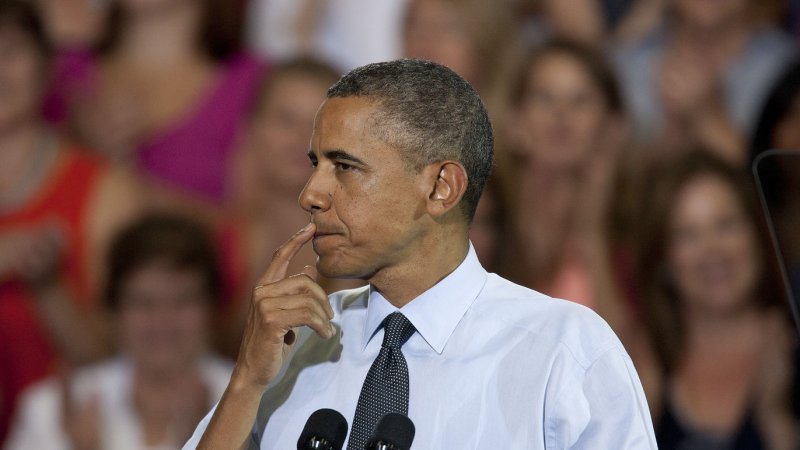President Barack Obama pauses before continuing his speech during a grassroots campaign stop at the Auraria Event Center in Denver on August 8, 2012. Obama spoke on women's health issues and Obamacare. UPI/Gary C. Caskey |
License Photo
WASHINGTON, Nov. 8 (UPI) -- U.S. President Obama's re-election and the Senate remaining under Democratic control have dashed Republican hopes of axing the healthcare law, observers said.
While maintaining that fully implementing the Affordable Care Act will be disastrous, the law's opponents finally are acknowledging it will, in fact, go into effect, The Hill reported.
"Repeal of the whole thing, I just don't see now how that's possible," said Grace-Marie Turner, president of the Galen Institute, a conservative healthcare think tank.
States, meanwhile, face a Nov. 16 deadline to tell the Obama administration whether they plan to run part of their own health insurance programs, the new state-based marketplaces that will make available subsidies for low- and middle-income individuals and small businesses to buy coverage.
Eventually, states also will have to decide whether they'll accept a larger expansion of Medicaid that would include a liberal match from the federal government along with the requirement that states kick in some of their own money, Politico said.
While most Republican states said they were waiting for the elections before making a formal decision, a number have been quietly planning to run their own if options for the ACA's demise ran out.
"I think you'll see a large number of states that have been waiting to begin to move more aggressively to implement," said David Merritt, managing director at Leavitt Partners, which advises GOP-led states on exchange implementation.
So far, 13 states and the District of Columbia have told the Department of Health and Human Services they plan to control their own exchanges. Two-thirds of states could be ready to run at least part of an exchange when they open for enrollment in October, Joel Ario, former HHS director of exchange planning, told Politico. At least five GOP governors have rejected setting up their own exchange.
"My best guess is that every other state is in some state of preparedness," Ario said, including states where governors have been outspoken against the law.
Plenty of questions remain on key rules governing exchanges, benefits health plans must cover, employer requirements and the Medicaid expansion, Politico said. Stakeholders, including health insurers, also face tight deadlines to prepare for core coverage expansions and consumer protection to go into effect in 2014.
"We're hoping to see proposed rules as soon as possible," said Justine Handelman, vice president of legislative and regulatory policy for the Blue Cross and Blue Shield Association. "We're now less than a year from open enrollment."















